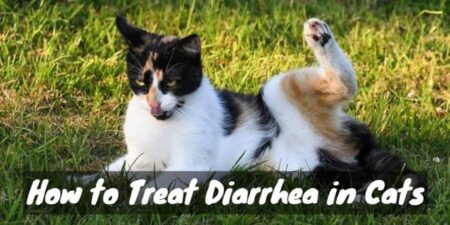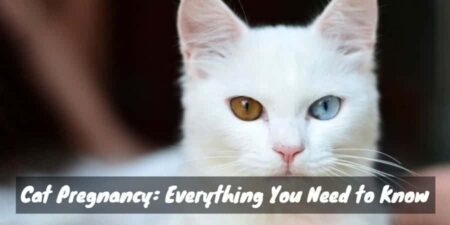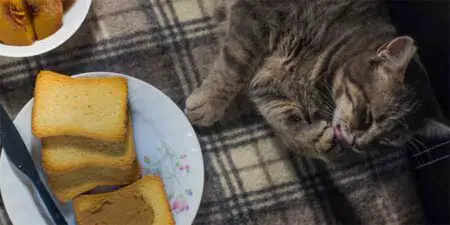Ever wondered why your cat should skip the milk saucer? We’ve all seen the TV commercials, cartoons, and movies of cats lapping milk from a bowl. However, in real life, my cat Nala got diarrhea every time I let her drink cow’s milk. If you’re wondering why your cat has stomach ailments after drinking cow’s milk, then read on.
In this article you’ll learn the following:
- The reasons why cow’s milk is unhealthy for cats
- How lactose intolerance in cats leads to digestive issues
- The difference in lactose content between cow’s milk and other dairy products
- Why kittens can digest milk but lose this ability as they grow
- The benefits and potential issues with giving your cat goat’s milk or other dairy alternatives
- The existence of lactose-free milk substitutes suitable for cats
- Some common myths surrounding cats and milk consumption
- The importance of consulting a veterinarian before changing your cat’s diet
Lactose Intolerance
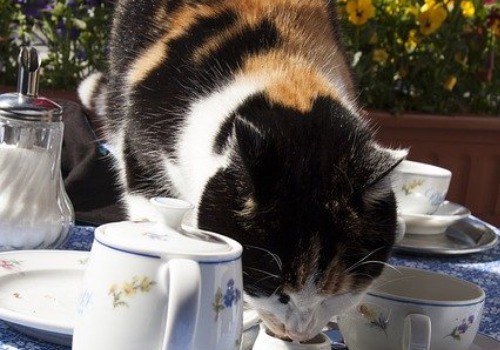
That image of a happy little kitten drinking cream or milk from a bowl is misleading. Cats may like cream since its high-fat content and rich texture make it appealing, and if it’s right from the cow, they may be able to drink it. However, most pet owners buy their milk at the grocery store.
Cats are basically lactose intolerant. In other words, they lack the enzymes needed to digest lactose found in cow’s milk and some dairy products. By now, most people are aware that lactose (a sugar) is found in milk. Just like my cat Nala, when most cats ingest cow’s milk, they incur stomach cramps and diarrhea.
You might be surprised that undigested lactose rests in the intestines and ferments. Why? Because lactose is unable to pass into the bloodstream, and instead, it interacts with bacteria in the intestines and ferments, causing myriad stomach problems over several hours.
Unfortunately, there’s no way to tell whether your cat is lactose intolerant unless you feed them milk. If your cat enjoys milk and does not incur any side effects, like gas, a rumbly stomach, or diarrhea, you can probably give her milk. Experts suggest organic milk if you’re able to provide your cat with this treat. Non-organic milk often comes with an extra ingredient, a growth hormone, which you want to avoid. Be sure to purchase milk with the label “rBGH-free.”
Milk Myths

It’s probably no surprise to you that cow’s milk and cat’s milk are different. Cow’s milk and goat’s milk have higher levels of lactose than cat’s milk. Therefore, while kittens can usually tolerate milk from a cow or a goat, if they’re lactose intolerant they may suffer the same side effects as adult cats, such as vomiting and diarrhea.
It’s true that barn cats love cream. When farmers milk their cows, and the fat from the cream rises to the top, barn cats lap it right up. Therefore, it is probably no surprise that people assume cats can safely drink cow’s milk. It is not that the cats dislike milk and cream, it is that it wreaks havoc on their digestive system.
So, even if it seems as though milk right from the cow would be good, we know it is not. Again, it is best not to believe the hype and keep high-lactose dairy products in the refrigerator and away from your cats. On the other hand, if you insist on providing milk for your cat, just like with a human, you could buy lactose-free milk.
A common misconception regarding cow’s milk is that it causes worms. Experts agree this is not true. The only time a kitten would get worms is if their mother has worms while nursing. Ideally, the mother will have been dewormed before pregnancy, which would prevent this.
Another myth is that all dairy products cause the same ill effects in your lactose-intolerant pets as milk. In small amounts, and on occasion, you can give your pet dairy products. For example, my pit bull loves cheese, so when I have to give her a pill, I wrap it in a cheese slice.
In addition, when it is hot outside, I drive my pit bull to Dairy Queen and get her a small vanilla ice cream cone. While my pet shows no stomach problems, be sure to check with your vet about your own pets and which medicines can and cannot be taken with dairy products.
Cats may tolerate foods like cheese and yogurt. Even if your cat is unable to tolerate milk, he/she may be able to eat butter and ice cream. Not all dairy products are created equal. Some forms have lower amounts of lactose, and some are diluted with water or fat. Finally, if the dairy product is “cultured,” that means it includes microorganisms that have digested the lactose.
Probiotics are all the rage today. This does not mean, however, you need to give Greek yogurt to your animals. The bacteria in their stomachs are not the same as human bacteria, and Greek yogurt is not necessarily a healthy food for pets. On occasion, small amounts of yogurt can be served as a treat. You are better off giving your pets sardines instead of yogurt.
If you are going to give your pet a sweet treat, like ice cream, be sure to give them the full-fat, least amount of chemicals version. Anything labeled sugar-free means a chemical crap storm. You want to avoid artificial sweeteners of any kind because they are like poison to your pets. (They are not great for you either!)
Why Can Kittens Drink Milk?
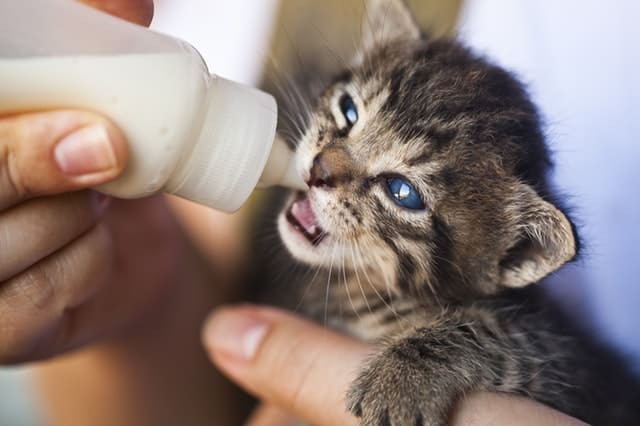
Just to keep you on your toes, it’s true that kittens can usually digest cow’s milk until their mother weans them. It’s because, at about eight weeks of age, kittens lose the enzyme lactase and can no longer digest lactose (lactose is a milk sugar that is broken down by the enzyme lactase). Still, be wary when giving dairy products to your kitten, especially if they are nursing.
Kittens gain the most nutritional benefits from their mother’s milk in the eight to ten weeks while they are nursing. Again, after the mother weans them and the cat graduates to cat food and soft food, they have little need for milk. (Perhaps that is why they lose their ability to digest milk!)
Best practices suggest if you need to find a replacement for mother’s milk, visit your favorite pet store. Talk to a veterinarian and/or the pet store consultant to be sure your kitten is getting the proper formula with the appropriate amounts of fats and nutrients. If you find yourself in a situation where you have to nurse a kitten separated too early from its mother, you can find replacements with the appropriate amount of fat and nutrients at most pet stores.
Although it will not leave a cute milk mustache, you are better off providing water for your cat. Unlike dogs, cats rarely “get thirsty” and run to a water bowl to get a drink. Pro tip: one of the ways to keep your cat hydrated is to offer canned food frequently, which provides the necessary moisture.
Miniature fountains have become quite popular as of late, and cats seem to enjoy drinking their water this way. You can purchase easy-to-assemble fountains online. They are convenient for your cat, making it easy for them to stay hydrated.
Milk and Pets
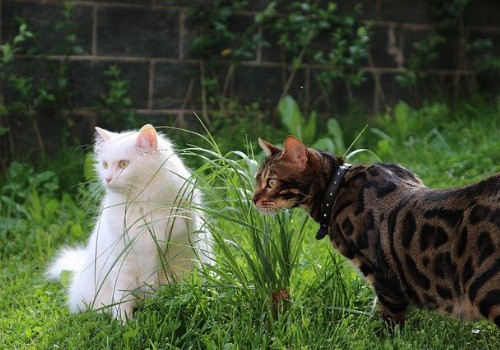
You may have heard that pets can digest goat’s milk more easily than cow’s milk. The biggest difference is that the smaller-sized fat globules in goat’s milk keep it from setting up camp in the large intestine and fermenting. Instead, the small intestine breaks it down, and pets are able to digest it. No stomach ailments!
When young pets nurse, their bodies produce high levels of lactase, which breaks down the lactose found in their mother’s milk. As pets age, their bodies lose the ability to create lactase and break down the lactose. Keep in mind that the amount of lactose in dairy products can vary.
Perhaps it is not surprising that unpasteurized cow’s milk and fermented dairy products are less harmful to an animal’s digestive system. Fermented milk goes through a process in which the lactose has already been broken down. Raw milk tends to have fewer lactose sugars than milk that goes through pasteurization.
Fermented goat’s milk is quite the magic potion. Veterinarians sometimes prescribe it to their patients with inflammatory bowel disease because of its digestibility, wealth of vitamins and minerals, and amino acids—which are good for the gut. Always check with your vet before giving your pet new foods.
After speaking with your veterinarian, the two of you can decide how much and how often you might be able to give your cat milk. Overweight cats obviously should be given milk as a treat, not a daily part of their diet. Dole out small amounts, like a teaspoon or so, and try lower fat contents before whole milk. If your cat is not overweight and he/she can tolerate it without stomach ailments, whole milk is fine.
A Few Last Words
If your cat loves milk, and you want to be able to give them milk without the nasty physical side effects, some lactose-free milk substitutes are available for your cat! These substitutes resemble cat’s milk closely and are healthier than cow’s milk.
Products such as Cat-Sip® and CatSure have been developed for the milk lover in your cat, and these products reduce the ill side effects. CatSure is for older cats who like milk, and it includes the necessary amino acids. You can find these products online or in your favorite pet stores.
Final Takeaways
- Cow’s milk lacks the essential nutrients cats need, can interfere with their appetite, and often causes stomach ailments due to lactose intolerance, a condition where cats lack the enzymes needed to digest lactose found in cow’s milk.
- The undigested lactose in a cat’s intestines ferments, interacting with bacteria and causing various stomach problems over several hours.
- Cats may tolerate certain dairy products like cheese and yogurt due to lower lactose levels or the presence of lactose-digesting microorganisms. However, it’s still recommended to consult with a vet.
- Kittens can usually digest cow’s milk until they’re weaned, after which they lose the enzyme lactase and can no longer digest lactose, potentially leading to digestive issues.
- While some pets can digest goat’s milk more easily due to its smaller fat globules, unpasteurized cow’s milk and fermented dairy products are generally less harmful as they contain fewer lactose sugars.
- Lactose-free milk substitutes like Cat-Sip® and CatSure are available for cats that enjoy milk, providing a healthier option that closely resembles cat’s milk and reduces adverse side effects.
What Really Happens When Cats Drink Milk? (Video)
"In ancient times cats were worshipped as gods; they have not forgotten this."
-- Terry Pratchett


